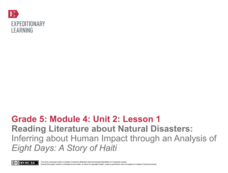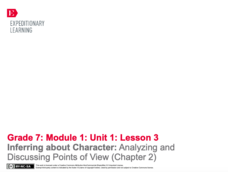Curated OER
Introduce Vocabulary: Clap Your Hands
Read Clap Your Hands to explore new vocabulary with your class. In this three-tiered vocabulary lesson, youngsters read the book and identify the plot, setting, and characters. They also define vocabulary terms from the book and answer...
University of California
Roots of the Cold War
When and how did the Cold War begin? To answer this question, you will not find a better-organized, in-depth, activity- and inquiry-based resource than this! Executing best teaching practices throughout, each portion of this inquiry...
Core Knowledge Foundation
First Grade Skills Unit 5
Twenty-two lessons make up a unit that focuses on first-grade skills. Scholars examine spelling alternatives—their rules and patterns, practice tricky spelling and high-frequency words, explore plural nouns and sentences, read a...
Book Units Teacher
Skill Lessons – Prefixes and Suffixes
Sometimes the best way to understand a concept is to break it down. Young vocabulary pupils work with word parts in a hands-on activity that prompts them to connect flash cards with affixes to their root and base words. Additionally,...
EngageNY
Reading Literature about Natural Disasters: Inferring about Human Impact through an Analysis of Eight Days: A Story of Haiti
This is a disaster. Scholars look through the book Eight Days: A Story of Haiti and discuss their wonderings about the text and natural disasters. They then complete a first read to determine gist and second read to answer text-dependent...
EngageNY
Planning for Writing: Introduction and Conclusion of a Literary Analysis Essay
First and last impressions are important. Using the helpful resource, scholars draft the introductory and concluding paragraphs of their literary analysis essays. Next, they use a writing evaluation rubric to self-assess their work.
Ogden Museum of Art Education Department
Literacy and Landscapes
As the saying goes, art often imitates life ... and literature! A series of activities designed to accompany a visit to the Ogden Museum of Southern Art encourage writers to find inspiration in various landscapes. The lesson includes a...
Curated OER
High Frequency Words
Phonemic awareness might not be a skill all autistic children will understand, but pattern and sight word recognition may prove to be more effective means of building strong reading skills. Use this set of twelve high frequency word...
Curated OER
High Frequency Words: Set 3
Here are twelve high frequency words that you can use as a game, flashcards, or to boost word recognition and reading skills. Intended for use with an autistic class but useful for any special needs or early readers. Just print, cut, and...
Curated OER
"Data Dabble"
Students engage in a lesson which facilitates their use of web sites to find data, graph it, and interpret it, thus scaffolding graphing skills to prepare students for their 8th grade I-search exit project.
Curated OER
After: A Study of Individual Rights
Use the dystopian novel After by Francine Prose to spark discussion about individual and student rights. Learners read the novel, evaluating how far a school can go to control its attendees. As they read, scholars fill out a chart...
Curated OER
Long Vowel U Sounds
This worksheet is straight-forward and easy to follow. Have your young learners look at the words below and place them in the correct category. Does the word have the ew letter combination or a u and silent e combination? For you very...
Curated OER
Discussing Poetry In Class
Students investigate syllabic metre and rhyming techniques by analyzing poetry. In this language arts activity, students read the poem Considering the Snail and discuss the nature and mood of the poem with their classmates. Students...
K12 Reader
If
Rudyard Kipling's advice to his son in the poem "If" is a resounding message that echoes through generations. After reading the famous poem, middle schoolers work on analyzing specific lines, completing activities based on unfamiliar...
University of Chicago
Using Artifacts for Clues About Identity
Learn about the ancient Near East through a close examination of ancient artifacts. Lead your class into analysis by first observing an artifact as a class. Pupils can then work in pairs to analyze the other artifacts and compile a list...
Curated OER
The Last Word: Using Critical Thinking and Analysis to Reach a Decision
Want to explore the process of writing a persuasive essay and tie it in with the upcoming elections? Class members use Venn diagrams and the hamburger model of persuasive writing to write a five-paragraph essay on elections and...
Curated OER
Eloquent Words
Logan’s Lament, a speech delivered by Mingo Chief Logan in 1774, provides pupils with an opportunity to not only study the historical events surrounding the battle between Native Americans and the Europeans for the West Virginia...
EngageNY
Inferring about Character: Analyzing and Discussing Points of View (Chapter 2)
Readers engage in discussion with partners to answer questions about A Long Walk to Water by Linda Sue Park. Next, they complete exit tickets, writing about how the author creates different points of view for her characters.
EngageNY
Inferring about Character: Analyzing and Discussing Points of View (Chapter 2)
Welcome to the World Café! Readers discuss A Long Walk to Water by Linda Sue Park. They circulate throughout the classroom, stopping at different tables to answer a discussion prompt with their classmates and record their ideas on a chart.
EngageNY
Using Multiple Resources of Information: Creating a Cascading Consequences Chart about DDT and Practicing a Fishbowl Discussion
For every action there is a consequence. Scholars continue their work on creating a cascading consequence chart about DDT using Welcome Back, The Exterminator, Rachel Carson: Sounding the Alarm on Pollution along with graphic organizers...
EngageNY
Poetry Analysis: Small Group Practice
Howdy partner! After discussion and teacher model reading of Slaveships, scholars pair up for a partner reading of the poem. They then use equity sticks to discuss their thoughts of the poem with the class. Readers talk about allusion,...
EngageNY
Studying Conflicting Information: Varying Perspectives on the Pearl Harbor Attack, Part 1
Scholars read President Roosevelt's Day of Infamy speech and analyze the speech's words using close reading guides. Readers determine Roosevelt's point of view after reading the speech and filling in the guides.
EngageNY
Character Analysis: Resilience
A Three Threes in a Row note catcher enables class members to dig deeper into the theme in Unbroken. They work with partners for 10 minutes and then rotate around the room to work with others. After regrouping and class discussion,...
EngageNY
Analyzing the Resolution of the Play: World Café Discussion
It's time to get active! Scholars participate in a World Café protocol to promote discussion and leadership. They leave their seats and move from group to group to discuss critical questions related to their read-aloud of Shakespeare's A...

























